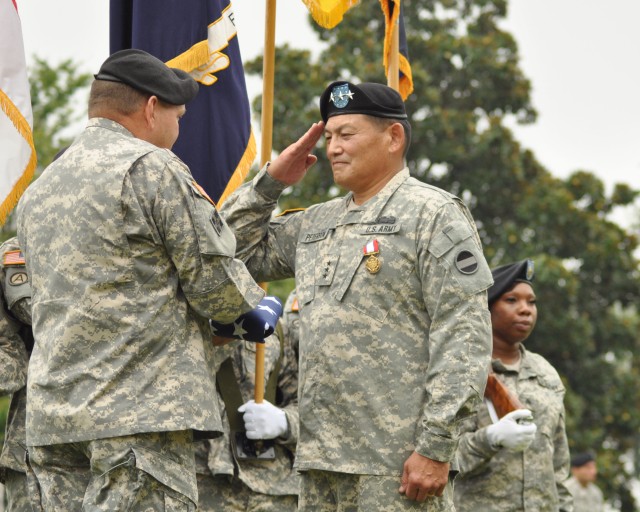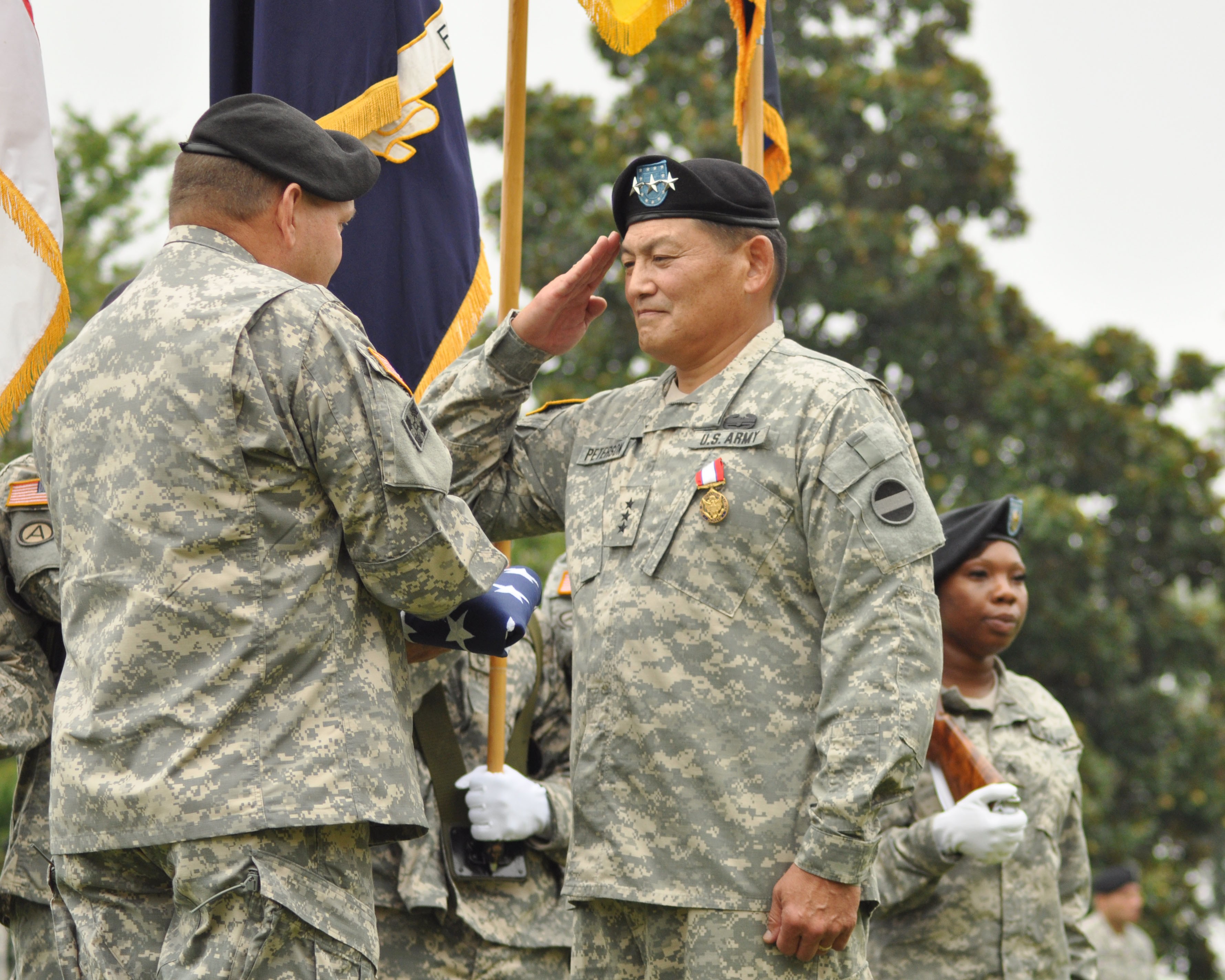
The first person of Hawaiian ancestry to wear the three stars of an Army lieutenant general retired at Fort McPherson Aug. 2 after 38 years of service to the Army and nation.
Lt. Gen. Joseph F. Peterson, deputy commanding general, U.S. Army Forces Command, had served as the deputy commander of FORSCOM since Dec. 11, 2006, when he arrived following service in Iraq.
Hosted by Gen. James D. Thurman, FORSCOM commanding general, Soldiers and Civilian staff gathered at the field in front of FORSCOM headquarters for the ceremony to honor Peterson.
"Today is a bittersweet day for me personally," said Thurman, "for (although) we are excited to have the opportunity to recognize an exceptional Army leader who has given 38 years of selfless service to this nation, we're also saddened to bid farewell to two dedicated members of our Army Family - Joe and Ann Peterson."
Thurman deferred honors to Peterson during the ceremony.
Accordingly, the salute battery comprised of FORSCOM Soldiers, led by Sgt. 1st Class Tiem Ambrose, fired 15 rounds in honor of the outgoing deputy commander before presenting the ceremonial shell casing to Peterson to represent the last round fired in his honor.
FORSCOM's Army Ground Forces Band, led by Capt. Treg Ancelet, commander and conductor of the band, performed traditional ceremonial music in honor of Peterson, including a special tribute - the traditional cavalry song "Garry Owen" - as homage to the general's past cavalry experience.
Peterson's position at FORSCOM was comparable to that of a chief operating officer in a large international corporation.
In this case, that large "corporation" was the Army's preeminent provider of expeditionary, campaign-capable land forces to the nation's combatant commanders.
Peterson served concurrently as deputy commanding general and chief of staff during a large portion of his time at FORSCOM.
He helped direct the training, mobilization, deployments, sustainment, transformation and reconstitution of FORSCOM's conventional forces that number around 848,000 Soldiers and around 3,500 Civilian staff across the command.
Approximately 900,000 Soldiers were deployed into the protracted fights in Afghanistan and Iraq during Peterson's almost four years at FORSCOM.
Peterson's impact on the wars in the Central Command area didn't start with his time at FORSCOM. He served in multiple high-impact assignments after Sept. 11, 2001.
However, the one that Peterson said he's particularly proud of was his time as the commander of a police assistance training team in Iraq.
Peterson was responsible for training 120,000 Iraqi civil servants: policemen, border and customs personnel, and fireman for the Iraqi Ministry of the Interior.
During this time, he was also responsible for equipping new Iraqi civil servants.
"I'm very, very proud of what we did there in the country of Iraq," said Peterson. "(It) really set the stage for this transition that we see right now ... where we're basically transitioning military security from the Iraqi military to civil security administered by the Iraqi ministry of interior and the (civilian) police forces of the country of Iraq."
Peterson said he also takes great pride in his role as an advisor to two different Iraqi ministers of the interior, both of whom Peterson said remain good friends with him to this day.
At the invitation of Peterson, Gen. Charles C. Campbell, former FORSCOM commanding general, came back to Fort McPherson to speak during the ceremony.
Campbell spoke of his perception of the career of Peterson.
"Joe's career is a wonderful mosaic," said Campbell. "It's a mosaic full of extraordinary achievement, contribution and accomplishment."
Peterson, a native of Honolulu, who stems from Japanese, Chinese and Hawaiian ancestry, described his career as a privilege.
"It's been a wonderful opportunity to come to work every day, looking forward to the chance to contribute to the team and make a difference," he said. "What made this (my career) even better was that I was able to do this side-by-side with my grade-school sweetheart," Peterson added.
He credits his wife, Ann, with supporting "her Soldier" and playing a huge role in his career.
The Petersons met when they were both in the fourth grade at the Star of the Sea Elementary School in Hawaii.
After a childhood together, the couple married and have been an Army Family team for 36-plus years of Peterson's career.
Campbell described how it all began for his friend.
"Joe actually attended a seminary high school for a year, preparing for the priesthood," said Campbell, "but as events unfolded, Joe decided not to pursue the priesthood." I
Instead, explained Campbell, "Joe has commented many times over the years ... that he 'Saw the Light!' ... meaning, of course, that he saw Ann."
Continuing his description of his old friend, Campbell drew his own moral to the impact of the childhood romance on Peterson's career.
"Think about it," said Campbell.
"Were it not for a beautiful woman and raging hormones, Joe might well have been a man of the cloth," he said, to the laughter and applause of the assembled guests, staff and Soldiers.
Then, on a serious note, Campbell praised his friend.
"He has always been an example: in word, in deed, in spirit and in faith," said Campbell, who was the last continuously serving general officer who served in the Vietnam War.
"On every occasion, he (Peterson) matched his deeds to his words and his behaviors to his values," said Campbell.
Peterson served 42 of his 44 months at FORSCOM with Campbell. Speaking of that time, Campbell said, "No commander has ever been blessed with a more loyal, dedicated and competent deputy."
Peterson, who Campbell refers to as the Army's "servant leader," said he owes his Army "three stars" to the Soldiers, Families and Civilian employees who supported him during his career.
"My extended Family taught me values, love and commitment," he said.

Social Sharing